Dear friends,
God bless vacations. I’m back from a week in Reykjavik, Iceland in which the sun never set and I danced as best I could with a freshly sprained ankle. The Most Fun Night Award goes to the Saturday at Dillon Whiskey Bar where I met 75-year-old queer DJ legend Andrea Jónsdóttir. Andrea sat high up on a ledge in bright yellow socks and hiking boots with a quadruple gin to one side and a black plastic flipbook of CDs to the other. She clasped my hands warmly and reassuringly when I shout-requested Skunk Anansie, then scanned her book with a magnifying glass and flashlight until she found the soundtrack of my youth.
In other words: I was in heaven? Doubly so because I got to spend meaningful time catching up with Brynhildur “Inka” Guðjónsdóttir, a brilliant actor, writer, director, and now artistic director. She’s a delightful human and my only friend who’s been knighted by the President of Iceland. The rest of you are slackers. (Ok, except for Andrea who was knighted not long after Brynhildur.)
Here are excerpts from a Zoom chat we had shortly after I got back. I’m continuing to seek some sanity in this era of artistic sector contractions and behind-the-scenes crises by extending a conversation across borders.
KT: Hi, good morning... or afternoon. Oh, nice Yale shirt!
BG: Yeah. It's held up since 2011. Good material.
KT: I first met you at Yale School of Drama in 2011 as a playwright. Can you tell me a bit about your journey to that point?
BG: The journey of being a writer really started with me having been an actor. I'd started writing and directing a little bit and I just needed time out from my career when I met Paula Vogel in Iceland. A theater here was doing How I Learned to Drive. A group of people who had been writing were invited to the American Embassy.
I had the privilege of meeting [Paula] there and she was very, very open, and just the way she is: spreading all the joy and making possibilities for people. And she said, well, any of you who want to try it out, apply. It just felt like such [an opportunity]. I was invited as a research fellow. But that was 2010. And then Paula took time off. So my way in got delayed a whole year... and maybe that was a blessing because I got to meet you!
KT: (laughs) Yes, it was.
BG: So writing for me up til then was: I'd written two plays, both had been produced, and then I was writing comedy sketches a lot. But mostly I just needed time out from my schedule. Because being an actor in Iceland... and you know, I'm a very fortunate artist... it was just, production after production after production and then you just don't do anything else. You get a tunnel vision on what you're doing. I needed the scope to be larger. That was what Yale really gave me.
I just turned up [in New Haven]… we had no money. I turned up with a completely new family, my daughter was 10, my husband and I, we had just kind of, you know, started gluing our things together; everything was new. And we just walked into this amazing place, and you know: [the Yale playwriting MFA program] is a three-year course with nine people in it! There is no place as giving, as understanding... I was just carried everywhere I went. And it was pretty fantastic because it both opened doors and make space in rooms that I knew were there... (she points to her own mind)... but I'd never had time to sit in them, in my own rooms.
KT: Then you came back home, and you were immediately super busy again as an actor.
BG: That's really what happened. But everything that happened in the months we spent at Yale was like a gift into whatever happened next. Granted, I didn't come back and become a full-time writer.
KT: No, instead you were adventurous across disciplines. You did more acting and directing, and now you're the artistic director of an essential theater in Iceland, the Reykjavik City Theatre.
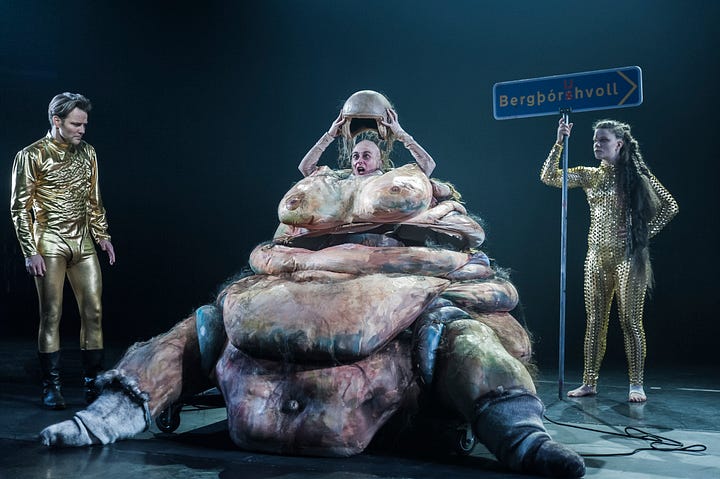
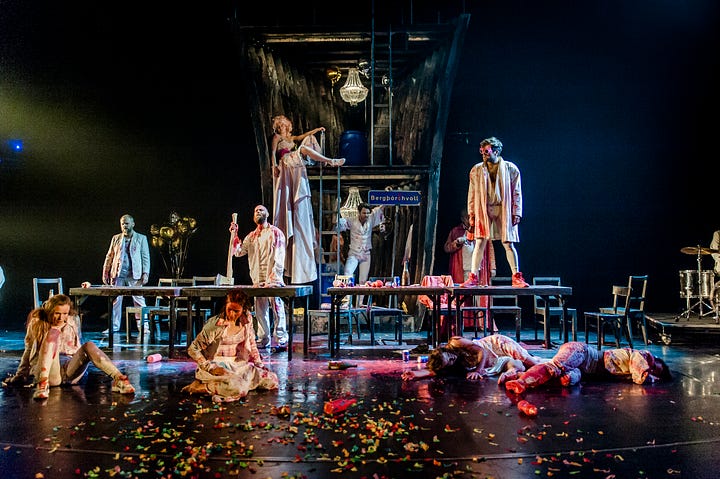
BG: Yeah, everything created the platform for that. The theatre I run now: I've done that since 2020, so three weeks before [pandemic] lockdown. I walked into a very important job. There's about 230 people working at our theatre. We are a repertory theatre producing 10 to 14 new plays each year. And we are 40 % subsidized, which means that 60 % is our own income.
It's very important for us to keep hold of the season ticket holders, so on, so forth. But we also want to cultivate playwrights. So, every year we have an in-house playwright at our theatre. There's a three-person board [that chooses the playwright]. I'm a member, and the head of the board is Lady Vigdís Fimboadóttir, who is our first democratically elected female president in the world. She's now going to be 94. A very important person.
We changed the rules when I took over as artistic director. Now our playwright, instead of having to create a play in one year, they stay with us two years. Because I want them to leave the play for a bit, do something else [and then come back]. That is the gift of understanding how a play gets written from Yale. So for the past four years, our playwrights come back for a second year with their plays having a stronger foundation. And then we have read-throughs and workshops.
KT: That's so generous. I would have to really think if there is a two-year long residency directly at a theater in the U.S. for playwrights. We do have longer term residencies at developmental organizations like New Dramatists and The Playwrights' Center, but less so at producing institutions.
BG: It's wonderful to be able to make this platform. I'm very, very proud of this fertile ground that the playwright at the Reykjavik City Theatre gets.
KT: Who are some of the Icelandic playwrights the world should know?
BG: Tyrfingur Tyrfingsson. You should know Tyrfingur Tyrfingsson, absolutely. Matthías Tryggvi Haraldsson. Birnir Jón Sigurðsson. Kristín Eiríksdóttir. All of them, curiously, are universal writers. So their plays would work in different countries. It's not specifically Icelandic, it's very collective as well as personal. They're writing on a very human note. [For example] they're writing about Alzheimer's, they're writing about mental health issues from the point of view of the person who is ill, which becomes very universal.
Tyrfingur Tyrfingsson, the one I mentioned first, we've produced six of his plays. He has had a real playground. It's not been from the beginning a very wide audience, but people know his name now. And now once we say, oh, it's a Tyrfingur Tyrfingsson play, everyone comes, and that to us is amazing. So: The new Icelandic play, we produce it, it's very expensive, and we get around 10 to 14 [performances] and that's pretty good! Someone like Tyrfingur is up to 25 or even 30 [performances] in a big auditorium, and that to us is huge. The population being 400,000 for the whole country.
KT: Iceland is so small but has such a robust cultural sector across disciplines, from music to street art to experimental performance. I'm curious what place theatre holds within that landscape. Would you say it's more of a niche interest, where you have theatre super fans who come see your shows, or is it part of the national culture to go to the theatre?
BG: It's definitely part of the national culture to go to the theatre. We're very fortunate. I think it stems from us being a storytelling nation. So back in the day when when you just lived in a mud hut... because the first houses, the first actual wooden houses built in Reykjavik, I mean that's around, 1899, 1902, 1905.... before that, you lived in houses of mud, very low structures. You had a fire inside where you were lighting dried up soil. You kept the cattle inside to keep you warm. And that's where ghost and elf stories stem from, because you're either in the dark, during winters, or living the endless light nights in summer.
What you do to just keep alive in the wintertime is that one person sits by the fire and tells the story. And of course, sitting by the fire the shadows will become endless and huge. And then you have to go out to the bathroom, and you have a very, very narrow dark corridor, and the story is still in your head, and you're walking, and you're thinking about all the ghosts that will haunt you and get you, so you have to go walk three times anti-clockwise around the house, otherwise the ghost is gonna get you...
Everything, all the natural elements, all the wind, all the sound, everything is made into a story. That's where we stem from. And then came the Icelandic sagas of people coming on boats to Iceland... strong men from Norway, lyrical women from Ireland and Scotland. That is the Icelanders. Lyrical savages. That's what we are. Crazy people. It doesn't really make sense to live here, but this is where we want to be.
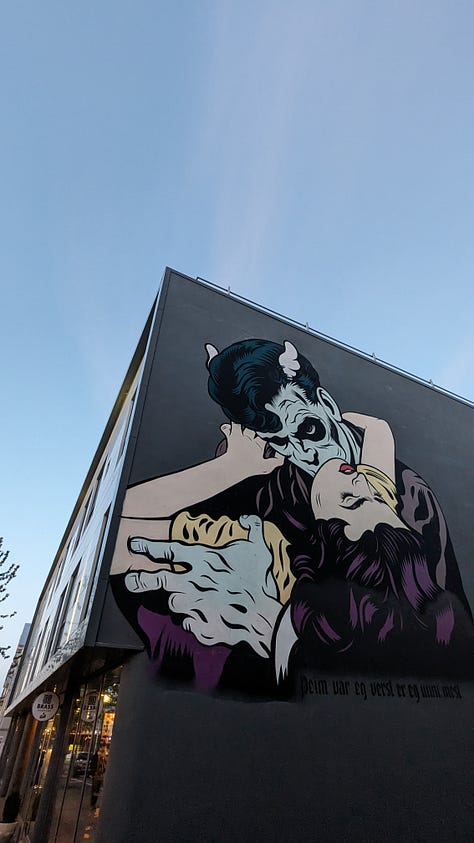
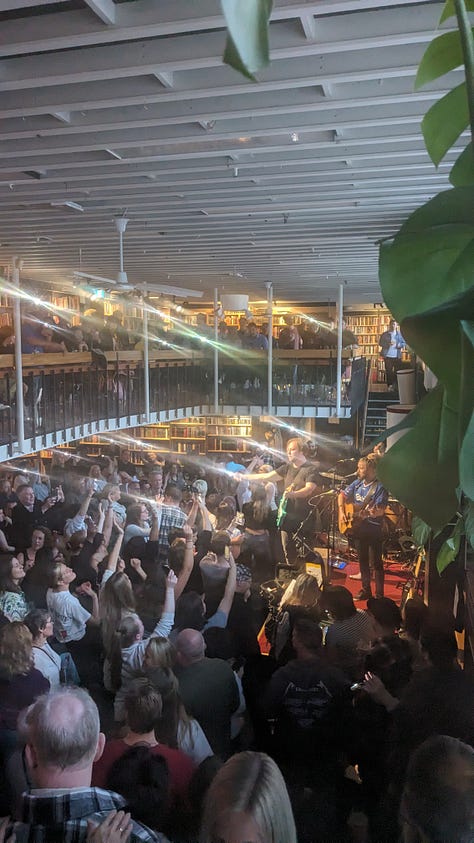
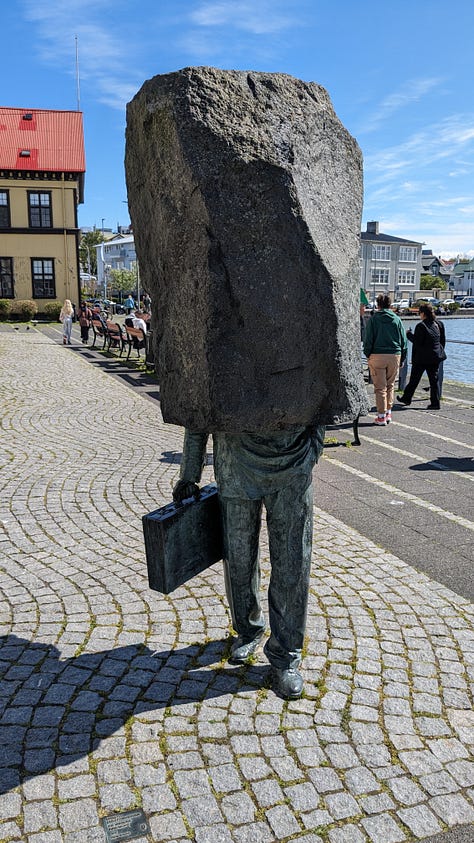
BG: So, the storytelling element is very strong, and it's very common for a household of a middle-class family in Iceland to hold season tickets to theatre. Culturally, writing and theatre, it's very, very important. And it's not at all something where people would go, "What is this? I don't understand this." Everyone understands theatre and I think it's just the storytelling background that luckily carries this forward.
But obviously, it's 2024, things are changing a lot with social media, with phones and everything. The average theatre goer, the person who buys the tickets is a 65-year-old woman and she will buy the tickets for everyone else. We need to create new audiences. It's a challenge, but we're finding ways. Our theatre is a public theatre, and we're very proud of that. That means that it's never elitist. Anyone can walk into the theater and they won't stand there and go, I don't belong here, I haven't read the book, I have no clue what this is... they come in. And they go: “Oh, there's my beer... I can dance here. And the story I'm being told, it's about me. It's not about a king or a privileged person. It's just about me.” The Icelandic play... the play about the average person, with music... that's what people want to come and see.
KT: You mentioned to me that American musicals are popular in your programming right now.
BG: Yeah, they are, but, but then again if it's too American... we tried Jagged Little Pill, but it didn’t reach our audiences. It was too niche.
KT: What was your biggest American musical hit?
BG: Is Mamma Mia American?
KT: I’m not sure. It's such a hodgepodge of cultural elements. [Editor’s note: Mamma Mia was written by British playwright Catherine Johnson, based on songs recorded by Swedish pop superground ABBA, composed by band members Benny Andersson and Björn Ulvaeus.]
BG: Mamma Mia, huge hit. Billy Elliot, Mary Poppins. Those are the ones we've done. And the next one we're banking on is Moulin Rouge! for the 25/26 season.
KT: That's interesting… those all follow what I’d consider to be American musical form but the stories are all set in European countries. You also mentioned to me that currently your largest immigrant group is from Poland, and that you also have been doing some shows with subtitles in Polish.
BG: Yeah, we've tried that, and we've even done a funny play in Polish where the subtitles were in English and Icelandic. So it was our turn to be like the foreigner in the room. But, what with immigrants one has to understand that, you know, why are these people emigrating? Why are they in a new country? Possibly to get a better life. They might not have gone to the theatre in their own country. Why would they all of a sudden go now? So we need to cater to them. We need to make them understand that this is fun. It's for you. It's: come have a fun night, have a beer.

KT: What's the social culture around seeing a play and talking about it after? In the UK some of the smaller theatres are directly above pubs, which means folks can stick around and socialize after, including with the theatre artists. In the US theatergoing is typically an individualized date night: you pair seeing a show with privately going out for dinner somewhere.
BG: Social culture for us is we have a big foyer for the three stages. So, a thousand people gather before the shows and then everyone goes into each auditorium. We have Iceland's longest bar. It really is very important to sell food and wine because we have to in order to survive.
We’re not downtown… we're close to downtown, but you know, you have a big parking space and not many people stay after the show. But we're trying to have live music. And we have the Danish-style smørrebrød. That's the food we have. There's not a big kitchen. You sit down and you order this and that, and you can do all that in the 20 to 30 minutes before you see the show.
KT: What are ticket prices like? Are they subsidized?
BG: We try to be the same price as the National Theatre of Iceland. We can't go above, but we really we would have to [to survive]. In a perfect world people would be able to afford that, but they can't. It's not like the West End or Broadway, where you decide, oh, I'm going to go see Lion King... it's going to cost a fortune, but we're here, we're in New York, we may as well do it.
We can't do that because we're a repertory theatre and we're trying to care for a company of actors. Our ticket prices can't be higher than the National Theatre, but we're a 40% subsidized company and they're at 80%. That's a huge difference, but we still have to pay the same wages and we have to sell the tickets the same way.
It's much harder. It's a thing that's not going to work out in the future. So we're just trying to figure out new ways of running this without letting the playwright go, without letting the children's play go, without losing all the [initiatives] where we're trying to embrace society. We're just trying to embrace everyone and and show everyone that theatre is the best place to be. And we don't want to lose these important projects and only be the musical theatre house with very high ticket prices.
KT: Obviously, tourism is huge in Iceland, but how many tourists make it to the Icelandic theatre?
BG: Not many. Because we play in Icelandic. It would just be the odd, real theatre lover... you know, someone who works in theatre in a different country, who doesn't care if they can't understand [a word]. Also, we're closed for the summer, we close June 15th and open again August 19th, so we don't grab the big tourist season. It is mainly an Icelandic audience.
Heimir Sverisson wanders into the room. He’s Brynhildur’s husband and an art director and production designer in film & TV.
KT: Hi Heimir, good to see you!
HS: Good to see you.
KT: (laughs) You're both wearing Yale shirts!
HS: Always!
KT: Since Heimir appeared, I'll also ask about the film industry in Iceland. Would you say it's a larger or smaller world than Icelandic theatre?
HS: It's much bigger. And getting bigger every year. There are more and more service projects and commercials, big studio films, Netflix, stuff like that. We have two big studios that are just getting bigger... and they are building more studios. The local industry is really blooming as well: TV series, original scripts. We shoot like five, six series a year and maybe six, seven films... up to ten. And that's just the local business. I don't know how many people are working only in films... like 1500 people maybe, who only do film work, or 2000 people altogether. Probably around that. And then there are the byproducts... the food service and workshop construction staff and stuff like that. We have two big construction shops. I own one of them. It's a blooming business. Especially since the 35 percent tax refund.
BG: That's what they do, you get a 35 percent tax refund if you make a film in Iceland. That's why the foreign productions are increasingly coming over here.
HS: So like HBO, Netflix, BBC, CBS, they're all here and they're all just making more and more projects here. In Ireland, the studios are all full. They're booked for the next five years. And that's the case in the UK, Germany, most of the studios. We had 30 percent [tax refund] and then went up to 35 percent, and then suddenly everybody came here. Next I'm working on a six episode TV series with Ólafur Darri Ólafsson in the leading role.
BG: He’s a fantastic actor, a huge guy, with a huge voice. We played Frida Kahlo and Diego Rivera.
HS: He works mostly in the States now. And then next I will work on a feature film based on a book with a very exciting director, a young Icelandic woman called Ugla Hauksdóttir. And then a big Hollywood film next year with a very exciting director and DP. So yeah! I'm really busy.
KT: At the same time, it doesn’t seem like the film/TV industry here steamrolls theatre or displaces it.
BG: No, it doesn’t, no. We're very lucky in that respect.
KT: You can co-exist peacefully. You can be married to each other happily.
BG: Yeah, we can!
HS: Yeah. With all our Yale everything… this is my working on the house T-shirt, it’s covered in paint.
IN CONCLUSION, IN CASE YOU NEED JUST A LITTLE MORE ABBA
Here’s a wild interpretation of ABBA’s Lay All Your Love On Me. Listen to this gorgeous collaboration between Caroline Shaw and Sō Percussion.






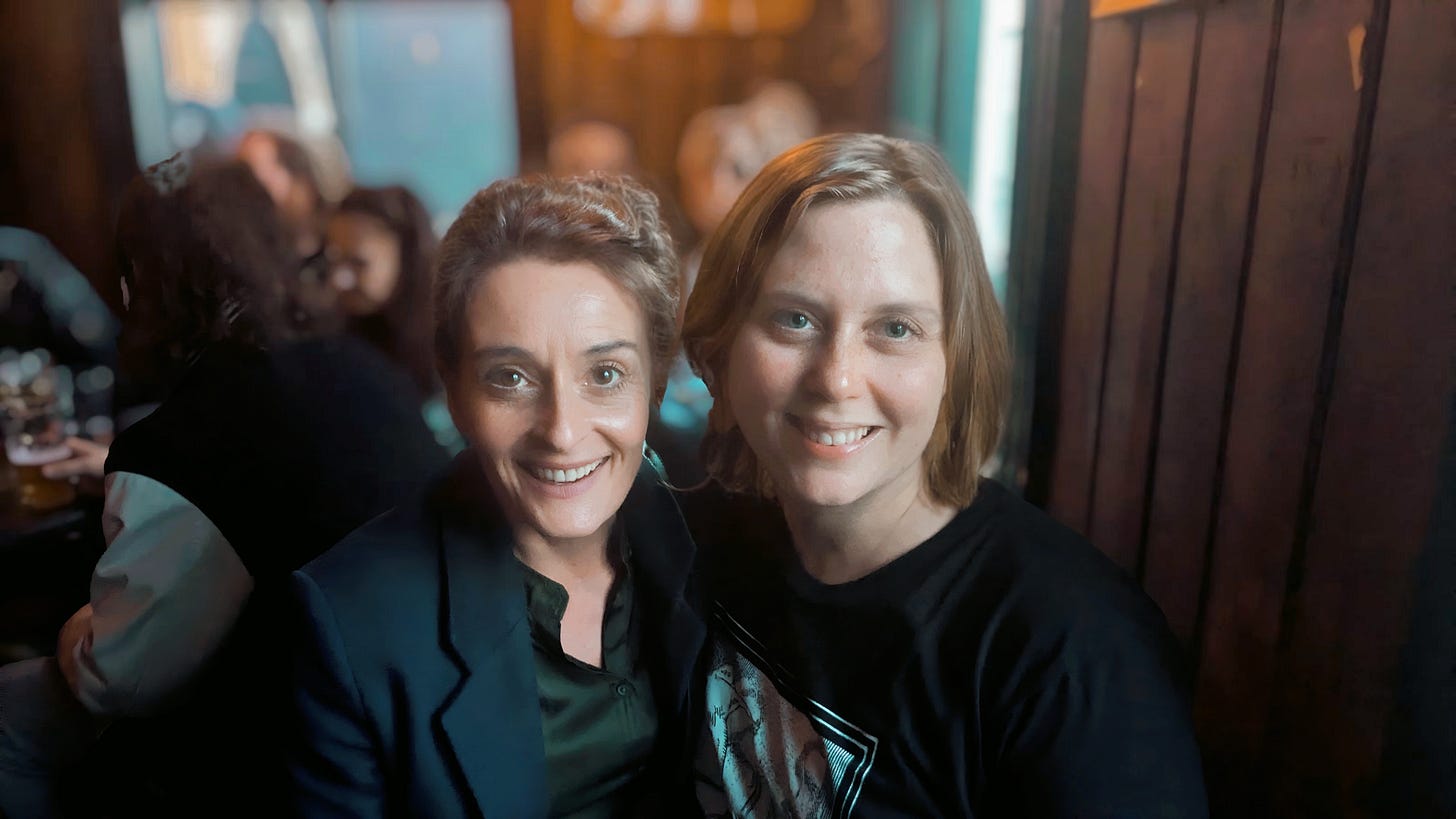
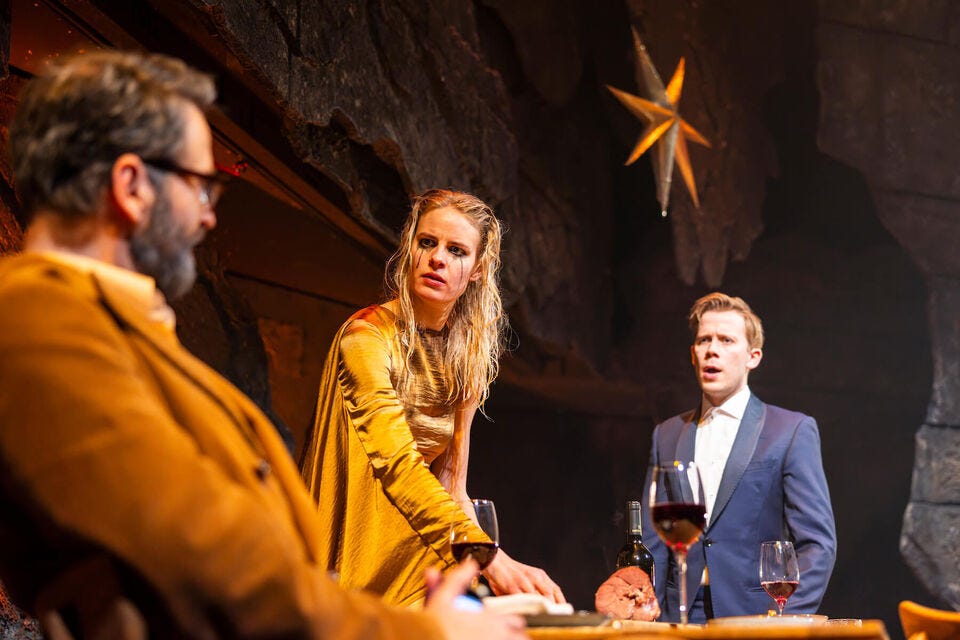

Fascinating!